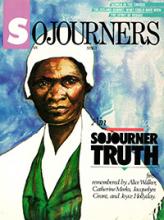... When Sojourner had been at Northampton a few months, she attended [a] camp meeting, at which she performed a very important part. A party of wild young men, with no motive but that of entertaining themselves by annoying and injuring the feelings of others, had assembled at the meeting, hooting and yelling, and in various ways interrupting the services and causing much disturbance. Those who had the charge of the meeting, having tried their persuasive powers in vain, grew impatient and tried threatening.
The young men, considering themselves insulted, collected their friends, to the number of a hundred or more, dispersed themselves through the grounds, making the most frightful noises, and threatening to fire the tents. It was said the authorities of the meeting sat in grave consultation, decided to have the ring-leaders arrested, and sent for the constable, to the great displeasure of some of the company, who were opposed to such an appeal to force and arms....Sojourner, seeing great consternation depicted in every countenance, caught the contagion and...found herself quaking with fear.
Under the impulse of this sudden emotion, she fled to the most retired corner of a tent and secreted herself behind a trunk, saying to herself,"I am the only colored person here and on me, probably, their wicked mischief will fall first, and perhaps fatally." But feeling how great was her insecurity even there, as the very tent began to shake from its foundations, she began to soliloquize as follows:
"Shall I run away and hide from the Devil? Me, a servant of the living God? Have I not faith enough to go out and quell that mob, when I know it is written—'One shall chase a thousand, and two put ten thousand to flight'? I know there are not a thousand here; and I know I am a servant of the living God. I'll go to the rescue, and the Lord shall go with and protect me.
Read the Full Article

